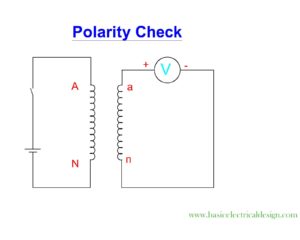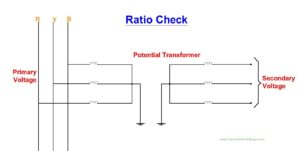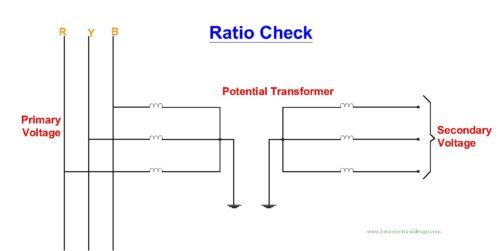Potential / Voltage transformers Testing and Pre-Commissioning Check
Potential /Voltage transformers can be broadly divided in to two type : Indoor and outdoor type.
- Indoor type – Cast resin.
- Outdoor type – Live tank, Oil cooled.These can be of electromagnetic of capacitive voltage transformer type (CVT).
PT rating are specified as follows –
1) Metering Core-
132 KV /3 : 100v / 3 – nominal ratio
100 VA – Rated burden Class 1.0- Accuracy is 1 %, between 80 % and 120 % of rated voltage and with burdens between 25 % and 100 % at 0.8
2) Protection core-
132 KV / 3 : 110 v / 3- Nominal ratio
100 Va- Rated burden
3P – Accuracy is 3 %, from 5 % of rated voltage upto the rated voltage factor 1.5 or 1.9 as the case may be ) and with burdens between 25% and 100 % at 0.8 lag.
Also specified is the rated voltage factor e.g. 1.9 times for 8 hrs or 1.5 for 30 second etc.
Pre- Commissioning Procedure for Voltage Transformers (PTs)
Physical inspection:
Check the below point:-
- The rating plate of PT and compare it with the drawings.
- The colour and level of oil in sight glass ( for outdoor PTs).
- Cracks and other signs of physical damage.
- Physical inspection of terminals & fuse rating and compare it with drawings. Wherever difference is found changes are to be marked up in the drawings.
- Continuity of PT primary fuses, where provided.
- The wiring of the PT secondary circuit by continuity test. Disconnection of wires is not required, as it is a high impedance circuit. However, disconnection of the secondary fuses or control plug is required, otherwise continuity will be obtained through the PT secondary windings.
Insulation resistance:-
Isolate PT primary neutral & secondary terminals in the junction box.
Measure insulation resistance and enter the result in the test report
Use :- 2.5 KV insulation tester ( 1 kv for earthed type PT) – up to 33 Kv
5 KV insulation tester ( 1 kv for earthed type PT)- above 33 KV
1 KV insulation tester – For secondary windings
Polarity Check:-
Arrange the test setup as shown in figure

Confirm the polarity is as shown in drawings.
Ratio Check:-
Connection the Circuit as per figure

- Measure the primary and secondary voltage and record it the test report.
- Measure the secondary voltage at the points in at all the points in the circuit. Phasing of the secondary winding can be checked by removing fuses in the primary circuit and check for loss of voltage in the secondary for the corresponding phase. Check the voltmeter circuits for proper function of voltmeter switch.
Precautions:
- Ensure that the PT body has been grounded by a separate conductor.
- The RF point in case of capacitor voltage transformers ( CVTs)has to be grounded, or if PLCC equipment is to be connected then the RF point is to be connected to the input of RF box.
- Ensure that the star point of the primary and secondary get a solid point.
